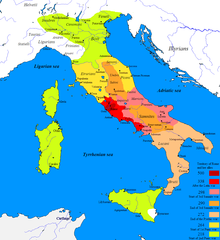Quintus Publilius Philo: Difference between revisions
Caitiemcmen (talk | contribs) No edit summary |
Rescuing orphaned refs ("WhosWho" from rev 787644352) |
||
| Line 14: | Line 14: | ||
#At least one censor must be a pleb. |
#At least one censor must be a pleb. |
||
The first of the three laws duplicates a later measure enacted by [[Quintus Hortensius (dictator)|Quintus Hortensius]]. It is probably fictitious.<ref name= |
The first of the three laws duplicates a later measure enacted by [[Quintus Hortensius (dictator)|Quintus Hortensius]]. It is probably fictitious.<ref name=WhosWho>Drummond, Andrew, "[http://oxfordindex.oup.com/view/10.1093/oi/authority.20110803100353718 Publilius Philo, Quintus]" in ''Who's Who in the Classical World'', January 2003, {{ISBN|9780192801074}}.</ref> |
||
During his first consulship in 339 BC, Publilius celebrated a triumph for a victory over the [[Latins (Italic tribe)|Latins]]. Tiberius Aemilius Mamercinus, his fellow consul, was so jealous that he abandoned the war against the Latins and returned to Rome to demand a triumph for himself.<ref>Livy, 8.12.7–9.</ref> |
During his first consulship in 339 BC, Publilius celebrated a triumph for a victory over the [[Latins (Italic tribe)|Latins]]. Tiberius Aemilius Mamercinus, his fellow consul, was so jealous that he abandoned the war against the Latins and returned to Rome to demand a triumph for himself.<ref>Livy, 8.12.7–9.</ref> |
||
Revision as of 12:28, 19 September 2017

Quintus Publilius Philo was a Roman politician who lived during the 4th century BCE. His birth date is not provided by extant sources, however, a reasonable estimate is c365 BCE given he first became consul in 339 BCE. Consuls were regularly elected in their twenties during the fourth century (Bagnall et al. 1987, p. 2.).[1] His praenomen (Quintus) suggests that he was one of five siblings. Lucius Papirus, who shared his several positions with Quintus, is presumed to have been his brother[2]. Publilius, his nomen, identifies his gens (house) as being the Publilii. This family was plebeian, yet included a variety of prominent figures. The Publilius gens was first illuminated upon the election of Publilius Volero as tribune in 472 BCE[3]. Volero passed two important pieces of legislation which increased the power of a Tribune [4]. Clearly, Philo came from a family accustomed to promoting the rights of the plebs. It is noted that his cognomen ‘Philo’ was unique to his family. The Publilii gens is said not to have had any prominent descendants. However, the noble women Publilia, who lived circa 154BCE, may have been a relative of Philo. She was accused of murdering her husband, a former consul despite Publilia’s plebeian status [5] Other potential descendants of his gens include Titus Publilius who was one of the “five augurs of the plebs” circa 299BCE [6] An Augur was somebody who acted as a priest (Dillon et al pg145 ). Each of these individuals exemplify that plebeian status within society can propel oneself into a life of good fortune and comfort. As it was known that the Publilii gens did not come from nobility, this family was a pillar within Rome in politics, the arts and the military.
Career
Livy writes in his History of Rome:
Publilius was a popular dictator, both because of his denunciation of the senate and because he carried through three laws very advantageous to the plebs and prejudicial to the nobles.[7]
These laws were:[7]
- Decisions of the Popular Assembly are binding on all quirites (Roman citizens).
- All measures proposed before the Centuriate Assembly receive senatorial sanction (patrum auctoritas) before being voted on.
- At least one censor must be a pleb.
The first of the three laws duplicates a later measure enacted by Quintus Hortensius. It is probably fictitious.[8]
During his first consulship in 339 BC, Publilius celebrated a triumph for a victory over the Latins. Tiberius Aemilius Mamercinus, his fellow consul, was so jealous that he abandoned the war against the Latins and returned to Rome to demand a triumph for himself.[9]
As censor in 332 BC, Publilius enrolled new Latin citizens and created the tribes of Maecia and Scaptia. He besieged Naples and Palaepolis in 327–326 during his second consulship. His term as consul expired during the siege. The Assembly extended Publilius' command by appointing him proconsul. He thus became the first Roman to hold this position. He secured the surrender of both cities with the help of friendly elements and celebrated a second triumph in 326 BC.[8]
After the Samnites humiliated a Roman army at Caudine Forks in 321 BC, the Romans granted Publilius a third consulship, together with Lucius Papirius Cursor. (This was Cursor's second consulship.) This was "a choice universally approved, for there were no commanders at that time of higher reputation," according to Livy.[10] Publilius again served with Cursor for a fourth and final consulship in 315 BC.[8]
References
- ^ Bagnall, Roger S. (1987). Consuls of the later Roman Empire. Scholars Press. p. 2.
- ^ Oakley, S.P. (1998). A Commentary on Livy, Books VI–X, Vol. 2: Books VII–VIII. Oxford University Press. p. 212.
- ^ Simon Hornblower, Antony Spawforth (2005). The Oxford Classical Dictionary. Oxford University Press.
- ^ Broughton, T.Robert. S. (1984). Magistrates of the Roman Republic. Atlanta, Ga. : Scholars Press. pp. 29, 30.
- ^ Livy per. 48.13.
- ^ Livy 10.9.2.
- ^ a b Livy, History of Rome, 8.12.14–16.
- ^ a b c Drummond, Andrew, "Publilius Philo, Quintus" in Who's Who in the Classical World, January 2003, ISBN 9780192801074.
- ^ Livy, 8.12.7–9.
- ^ Livy 9.7.15.
